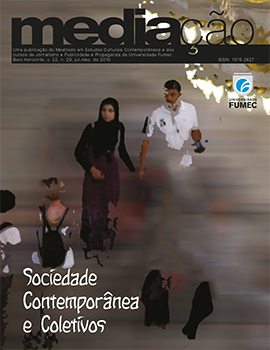ATIVISMO DE SOFÁ OU PARTICIPAÇÃO POLÍTICA? OS PROCESSOS DE POLITIZAÇÃO DO ATIVISMO POR HASHTAG
Palavras-chave:
Politização, Feminismo, Ativismo Digital, Hashtag FeministaResumo
O objetivo central do trabalho é compreender como os esforços de mobilização através de hashtags podem produz processos de politização para fora das redes sociais. Por meio de análise exploratório da hashtag Chega de Fiufiu na plataforma Twitter, pretendemos compreender como a conversação gerada nessas mobilizações se conectam com as esferas privada, pública e governamental e incitam o processo de politização. A análise revela que o incentivo aos relatos de si nas hashtag serviram como ponto de partida para outros debates e interações, que ajudaram a consolidar a pauta enquanto demanda pública, se consolidando, assim enquanto ativismo digital.Referências
BENNETT, W. L.; SEGERBERG, A. The logic of connective action. Information, Communication & Society, v. 15, n. 5, p. 739–768, 2012.
BENNETT, L.W.; LIVINGSTON, S. The disinformation order: Disruptive communication and the decline of democractic institutions. European Journal of Communication, v. 2, n. 33, 2018.
BAER, H. Redoing feminism: Digital activism, body politics, and neoliberalism. Feminist Media Studies, v. 16, n. 1, p. 17–34, 2016.
CHOI, S.; PARK, H. W. An exploratory approach to a Twitter-based community centered on a political goal in South Korea: Who organized it, what they shared, and how they acted. New Media and Society, v. 16, n. 1, p. 129–148, 2014.
CLARK, Rosemary. “Hope in a hashtag”: the discursive activism of# WhyIStayed. Feminist Media Studies, v. 16, n. 5, p. 788-804, 2016.
D’ANDRÉA, Carlos. Rumo a uma plataformização do social. Letras, n.53, 2017, p.17.
DIXON, Kitsy. Feminist online identity: Analyzing the presence of hashtag feminism. Journal of Arts and Humanities, v. 3, n. 7, p. 34-40, 2014.
FREITAS, Viviane Gonçalves. Mulheres negras e imprensa feminista: vozes, interseccionalidade e cidadania. Compolítica, v. 8, n. 2, p. 145-170, 2018.
GERBAUDO, Paolo. The mask and the flag: Populism, citizenism, and global protest. Oxford University Press, 2017.
GILLESPIE, Tarleton. Custodians of the Internet: Platforms, content moderation, and the hidden decisions that shape social media. Yale University Press, 2018.
GILLESPIE, Tarleton. The platform metaphor, revisited. Culture Digitally. Disponível em: http://culturedigitally.org/2017/08/ platform-metaphor/>. Publicado em ago.2017. Acesso em: 30 de setembro de 2019.
GILLESPIE, Tarleton. The politics of ‘platforms’. New media & society, v. 12, n. 3, p. 347-364, 2010.
GUNN, Caitlin. Hashtagging from the Margins: Women of Color Engaged in Feminist Consciousness-Raising on Twitter. Women of Color and Social Media Multitasking: Blogs, Timelines, Feeds, and Community, p. 21-34, 2015.
HAY, C. Why we hate politics. Cambridge: Polity Press, 2007.
HOPKE, Jill E. Hashtagging politics: Transnational anti-fracking movement Twitter practices. Social Media+ Society, v. 1, n. 2, p. 2056305115605521, 2015.
KLANG, M.; MADISON, N. The domestication of online activism. First Monday, 21(6), 2016.
MARMURA, S. A net advantage? The internet, grassroots activism and American Middle-Eastern policy. New Media and Society, v. 10, n. 2, p. 247–271, 2008.
MAIA, R. Politicization, New Media, and Everyday Deliberation. In: FAWCETT, Paul; FLINDERS, Matthew; HAY, Colin; WOOD, Matthew. Anti-Politics, Depoliticization, and Governance. Oxford University Press, 2017.
MATOS, Marlise. A quarta onda feminista e o campo crítico-emancipatório das diferenças no Brasil: entre a destradicionalização social e o neoconservadorismo político. 38º ENCONTRO ANUAL DA ANPOCS. Anais... Caxambu, 2014
MENDONÇA, Ricardo Fabrino et al. Protests as “Events”: The Symbolic Struggles in 2013 Demonstrations in Turkey and Brazil. Revista de Sociologia e Política, v. 27, n. 69, 2019.
POELL, Thoma; VAN DIJCK, José . Social Media and Activist Communication. In The Routledge Companion to Alternative and Community Media, 527-537, London: Routledge, 2015.
TUFEKCI, Z.; WILSON, C. Social Media and the Decision to Participate in Political Protest: Observations From Tahrir Square. Journal of Communication, v. 62, n. 2, p. 363–379, 2012.
VAN DIJCK, José. The Culture of Connectivity. New York: Oxford Press, 2013.
YANG, G. Narrative Agency in Hashtag Activism: The Case of #BlackLivesMatter. Media and Communication, v. 4, n. 4, p. 13, 2016.
Downloads
Publicado
Edição
Seção
Licença
Os direitos autorais dos artigos publicados ficam reservados à Faculdade de Ciências Humanas da Universidade Fumec. As opiniões expressas nos artigos assinados são de responsabilidade exclusiva de seus autores.
A Revista Mediação é licenciada sob uma Licença Creative Commons Atribuição-NãoComercial-SemDerivados 3.0 Brasil.





